人教版高一英语必修三 unit2 Healthy eating Language points(共21张PPT)
文档属性
| 名称 | 人教版高一英语必修三 unit2 Healthy eating Language points(共21张PPT) | 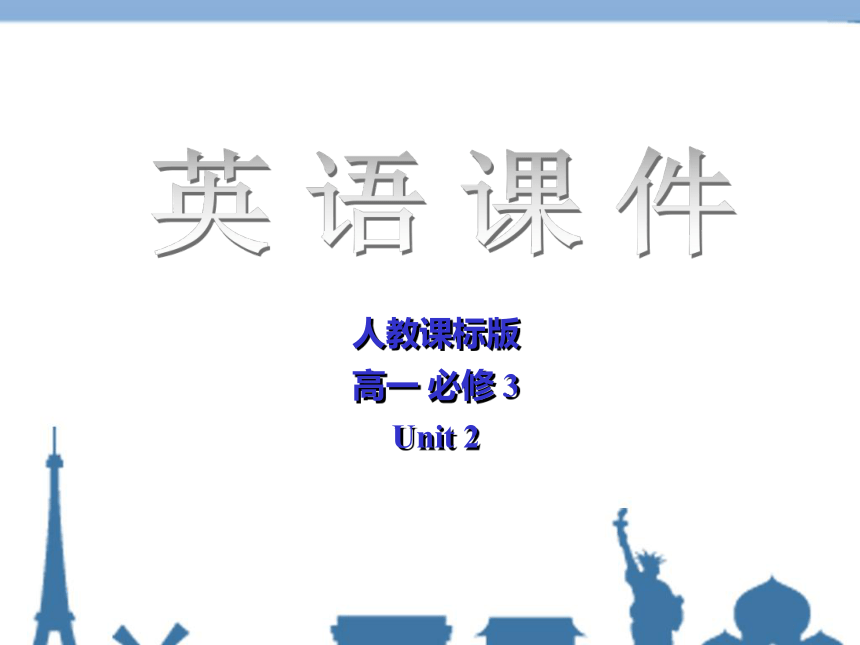 | |
| 格式 | zip | ||
| 文件大小 | 868.5KB | ||
| 资源类型 | 教案 | ||
| 版本资源 | 人教版(新课程标准) | ||
| 科目 | 英语 | ||
| 更新时间 | 2020-03-29 18:44:09 | ||
图片预览

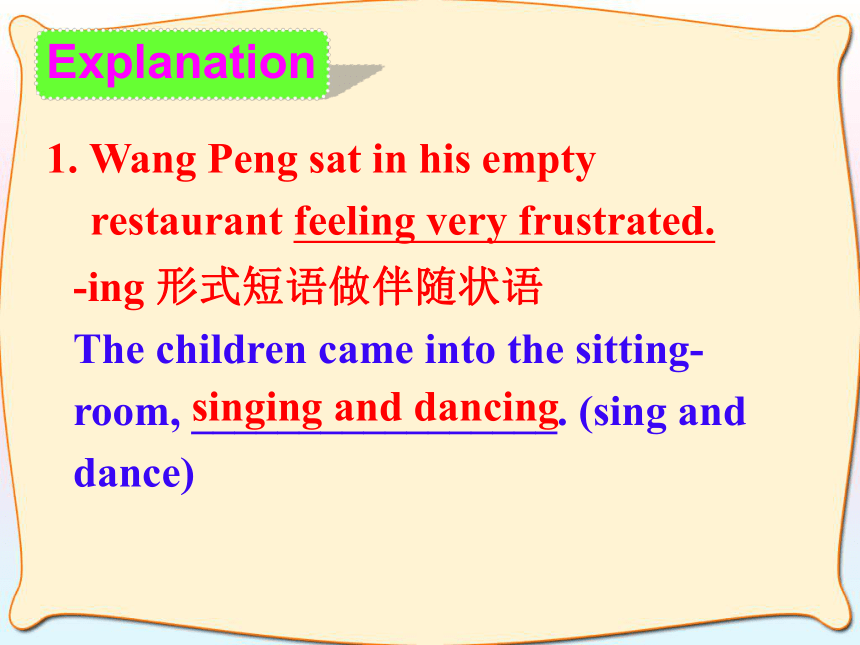
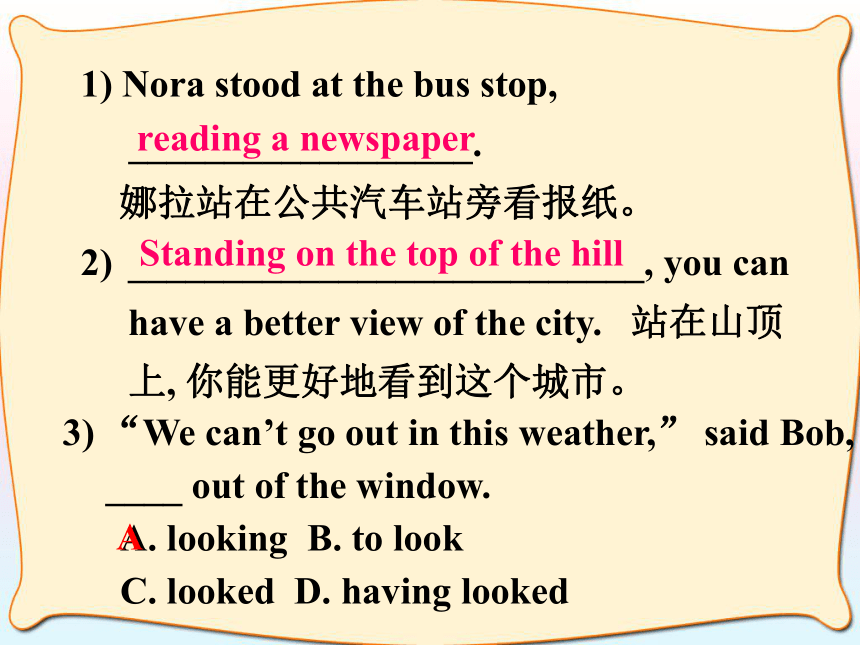
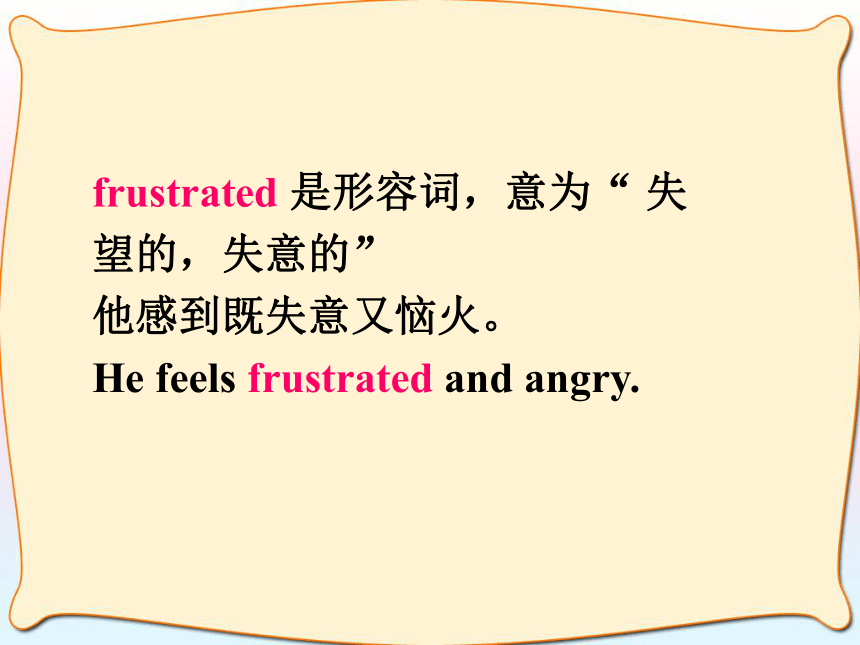
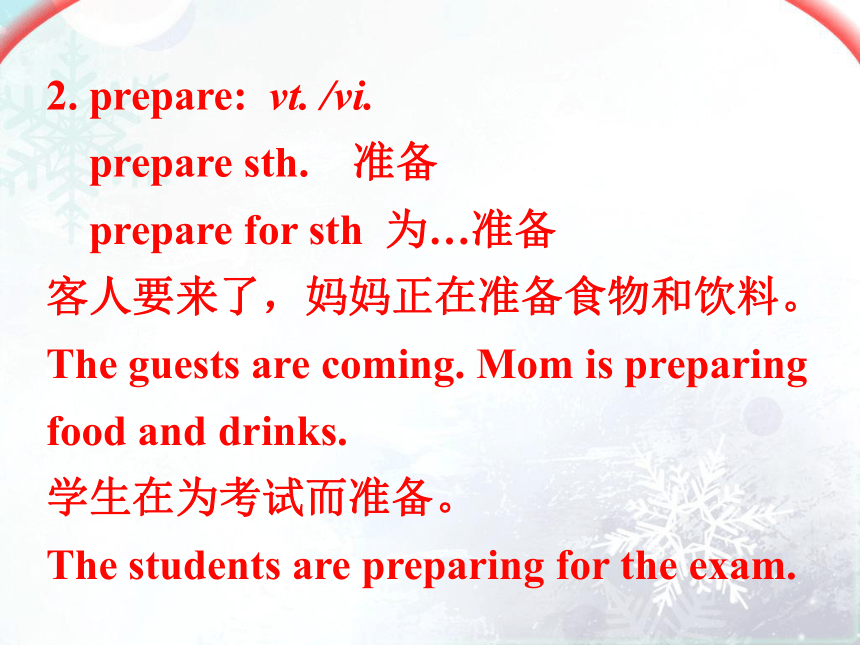
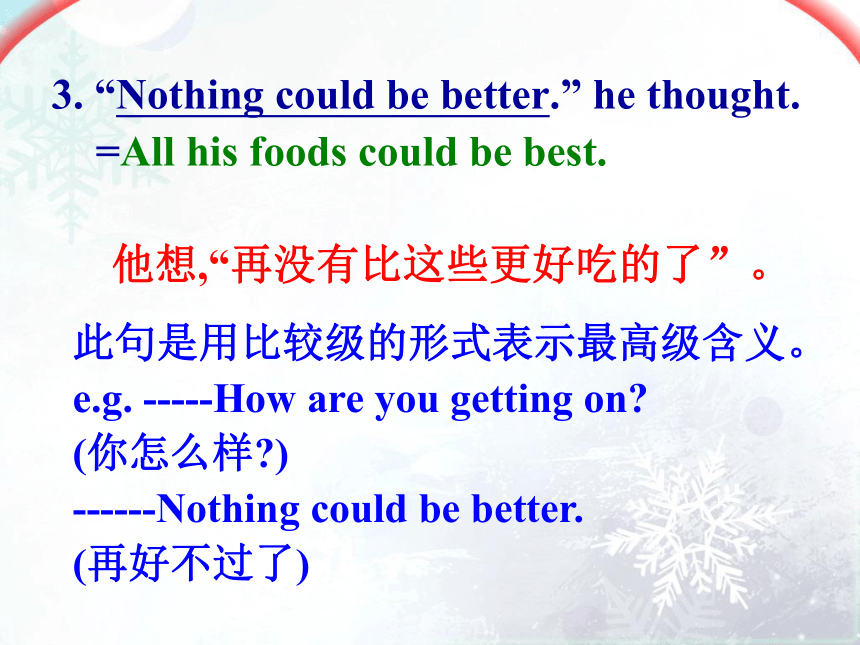
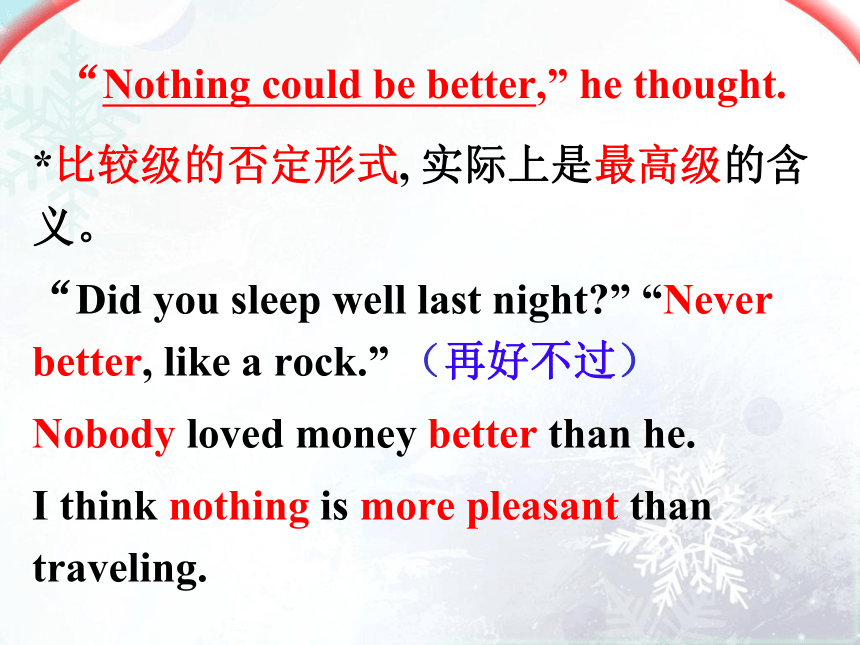
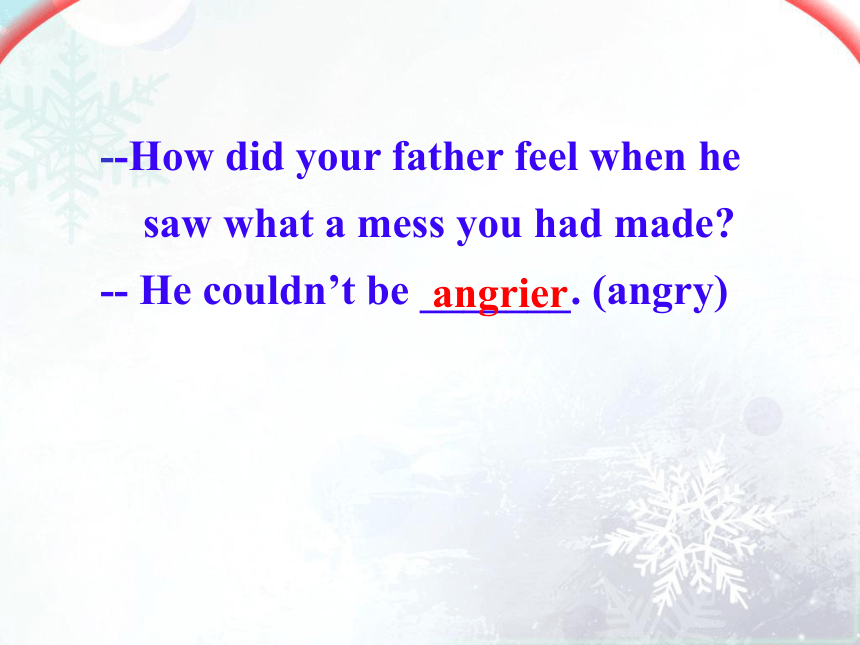
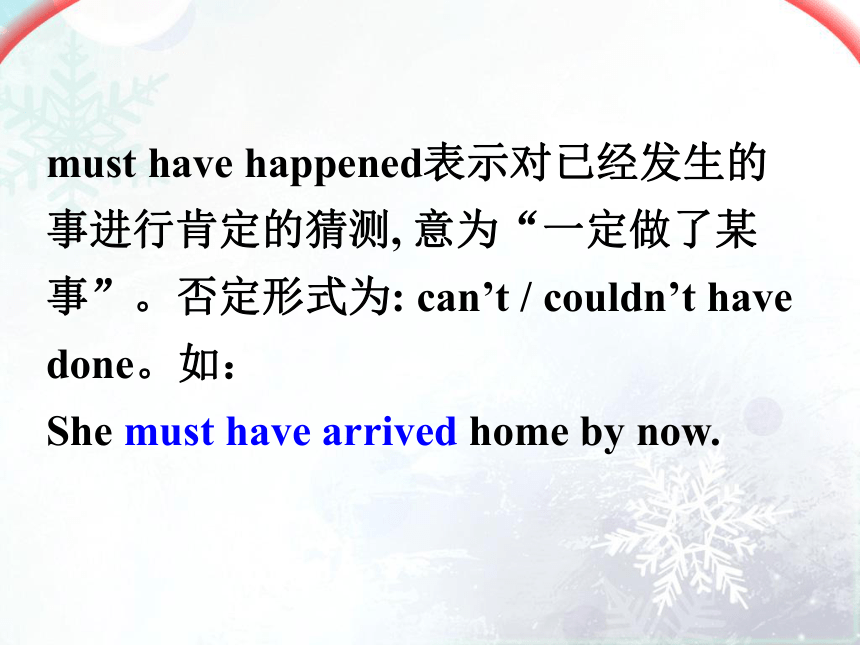
文档简介
(共22张PPT)
人教课标版
高一 必修 3
Unit 2
Explanation
-ing 形式短语做伴随状语
The children came into the sitting-room, _________________. (sing and dance)
1. Wang Peng sat in his empty restaurant feeling very frustrated.
singing and dancing
1) Nora stood at the bus stop,
__________________.
娜拉站在公共汽车站旁看报纸。
___________________________, you can have a better view of the city. 站在山顶上, 你能更好地看到这个城市。
reading a newspaper
Standing on the top of the hill
3) “We can’t go out in this weather,” said Bob, ____ out of the window.
A. looking B. to look
C. looked D. having looked
A
frustrated 是形容词,意为“ 失望的,失意的”
他感到既失意又恼火。
He feels frustrated and angry.
2. prepare: vt. /vi.
prepare sth. 准备
prepare for sth 为…准备
客人要来了,妈妈正在准备食物和饮料。
The guests are coming. Mom is preparing food and drinks.
学生在为考试而准备。
The students are preparing for the exam.
3. “Nothing could be better.” he thought. =All his foods could be best.
此句是用比较级的形式表示最高级含义。
e.g. -----How are you getting on?
(你怎么样?)
------Nothing could be better.
(再好不过了)
他想,“再没有比这些更好吃的了”。
*比较级的否定形式, 实际上是最高级的含义。
“Did you sleep well last night?” “Never better, like a rock.” (再好不过)
Nobody loved money better than he.
I think nothing is more pleasant than traveling.
“Nothing could be better,” he thought.
--How did your father feel when he
saw what a mess you had made?
-- He couldn’t be _______. (angry)
angrier
must have happened表示对已经发生的事进行肯定的猜测, 意为“一定做了某事”。否定形式为: can’t / couldn’t have done。如:
She must have arrived home by now.
tired adj.累的, 疲劳的; 厌烦的, 烦倦的
Are you tired of doing the same thing every day?
5. Tierd of all that fat?
be/get tired of 对…厌烦
6. Curiosity drove Wang Peng inside.
drive: vt. 驱赶 (动物), 驱使……
We at last drove the enemy out of our country.
我们最后把敌人驱逐出我们的国家。
那噪音令我发疯。
The terrible noise drove me mad.
7. Wang Peng was amazed at this and especially at the prices.
be amazed at….
对……感到惊讶, 惊愕
e.g. You would be amazed at how difficult it was.
8. It cost more than a good meal in his restaurant.
@ cost表花_____,作主语的是______
sth cost/costs (sb) sth
@ spend既可指花 _____,又可指花_____。在主动语态作主语的应当是_____, 宾语可以是money, energy, time。
“钱”
“物”
“钱”
“时间”
“人”
常用句型为:
1)sb. + spend + 宾语 + on + sth.
2)sb. + spend + 宾语 + (in) doing sth.
@ take 一般表花 ______,常用于句型:
___________________________
@ pay 一般表 _______,在主动语态中做主
语的应当是______,常跟for连用。
“付钱”
“人”
“时间”
It takes sb. some time to do sth.
sb. pay(s)/payed sb. some money for sth.
1) How much does it ____?
2) She _____ a lot of money on books.
3) It _____ her 20 minutes to go to school.
4) She ____ him 10 yuan for the shirt.
cost
spent
takes
paid
9. He couldn’t have Yong Hui getting away with telling people lies! 他可不能让咏慧哄骗人们!
a) have sb. doing
allow or tolerate (sth). 表示允许或容忍(某事物)发生
不好意思,让你等了那么久。
I’m sorry to for so long.
have you waiting
我不能容忍(允许)你考试作弊而不受处罚。
I won’t have you getting away with cheating in the exam.
b) get away with doing sth.
不因某事受惩罚
10. He had better do some research.
research n. & v.研究;调查;探索
do research into / on 对……进行研究/调查
他们正在对一些社会问题进行调查研究。
They are doing some research on some social problems.
13. The competition between the two restaurants was on!
on作副词与be连用时,可以表示以下几个意思:
(1) (电灯、水等)开着
(2) 正在进行,举行
(3) 上演,演出
① 灯都亮着。
The lights were all on.
② 他们家的电视总是开着。
The TV is always on in their house.
③电影院在上演什么片子?
What’s on at the movie?
④ 我到电影院的时候,电影已经开演五分
钟了。
The film had been on for five minutes
when I got to the cinema.
人教课标版
高一 必修 3
Unit 2
Explanation
-ing 形式短语做伴随状语
The children came into the sitting-room, _________________. (sing and dance)
1. Wang Peng sat in his empty restaurant feeling very frustrated.
singing and dancing
1) Nora stood at the bus stop,
__________________.
娜拉站在公共汽车站旁看报纸。
___________________________, you can have a better view of the city. 站在山顶上, 你能更好地看到这个城市。
reading a newspaper
Standing on the top of the hill
3) “We can’t go out in this weather,” said Bob, ____ out of the window.
A. looking B. to look
C. looked D. having looked
A
frustrated 是形容词,意为“ 失望的,失意的”
他感到既失意又恼火。
He feels frustrated and angry.
2. prepare: vt. /vi.
prepare sth. 准备
prepare for sth 为…准备
客人要来了,妈妈正在准备食物和饮料。
The guests are coming. Mom is preparing food and drinks.
学生在为考试而准备。
The students are preparing for the exam.
3. “Nothing could be better.” he thought. =All his foods could be best.
此句是用比较级的形式表示最高级含义。
e.g. -----How are you getting on?
(你怎么样?)
------Nothing could be better.
(再好不过了)
他想,“再没有比这些更好吃的了”。
*比较级的否定形式, 实际上是最高级的含义。
“Did you sleep well last night?” “Never better, like a rock.” (再好不过)
Nobody loved money better than he.
I think nothing is more pleasant than traveling.
“Nothing could be better,” he thought.
--How did your father feel when he
saw what a mess you had made?
-- He couldn’t be _______. (angry)
angrier
must have happened表示对已经发生的事进行肯定的猜测, 意为“一定做了某事”。否定形式为: can’t / couldn’t have done。如:
She must have arrived home by now.
tired adj.累的, 疲劳的; 厌烦的, 烦倦的
Are you tired of doing the same thing every day?
5. Tierd of all that fat?
be/get tired of 对…厌烦
6. Curiosity drove Wang Peng inside.
drive: vt. 驱赶 (动物), 驱使……
We at last drove the enemy out of our country.
我们最后把敌人驱逐出我们的国家。
那噪音令我发疯。
The terrible noise drove me mad.
7. Wang Peng was amazed at this and especially at the prices.
be amazed at….
对……感到惊讶, 惊愕
e.g. You would be amazed at how difficult it was.
8. It cost more than a good meal in his restaurant.
@ cost表花_____,作主语的是______
sth cost/costs (sb) sth
@ spend既可指花 _____,又可指花_____。在主动语态作主语的应当是_____, 宾语可以是money, energy, time。
“钱”
“物”
“钱”
“时间”
“人”
常用句型为:
1)sb. + spend + 宾语 + on + sth.
2)sb. + spend + 宾语 + (in) doing sth.
@ take 一般表花 ______,常用于句型:
___________________________
@ pay 一般表 _______,在主动语态中做主
语的应当是______,常跟for连用。
“付钱”
“人”
“时间”
It takes sb. some time to do sth.
sb. pay(s)/payed sb. some money for sth.
1) How much does it ____?
2) She _____ a lot of money on books.
3) It _____ her 20 minutes to go to school.
4) She ____ him 10 yuan for the shirt.
cost
spent
takes
paid
9. He couldn’t have Yong Hui getting away with telling people lies! 他可不能让咏慧哄骗人们!
a) have sb. doing
allow or tolerate (sth). 表示允许或容忍(某事物)发生
不好意思,让你等了那么久。
I’m sorry to for so long.
have you waiting
我不能容忍(允许)你考试作弊而不受处罚。
I won’t have you getting away with cheating in the exam.
b) get away with doing sth.
不因某事受惩罚
10. He had better do some research.
research n. & v.研究;调查;探索
do research into / on 对……进行研究/调查
他们正在对一些社会问题进行调查研究。
They are doing some research on some social problems.
13. The competition between the two restaurants was on!
on作副词与be连用时,可以表示以下几个意思:
(1) (电灯、水等)开着
(2) 正在进行,举行
(3) 上演,演出
① 灯都亮着。
The lights were all on.
② 他们家的电视总是开着。
The TV is always on in their house.
③电影院在上演什么片子?
What’s on at the movie?
④ 我到电影院的时候,电影已经开演五分
钟了。
The film had been on for five minutes
when I got to the cinema.
同课章节目录
